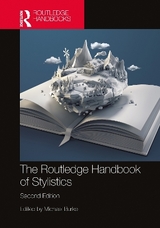
The Routledge Handbook of Stylistics
Routledge (Verlag)
978-0-415-52790-3 (ISBN)
- Titel erscheint in neuer Auflage
- Artikel merken
The Routledge Handbook of Stylistics provides a comprehensive introduction and reference point to key areas in the field of stylistics. The four sections of the volume encompass a wide range of approaches from classical rhetoric to cognitive neuroscience and cover core issues that include:
historical perspectives centring on rhetoric, formalism and functionalism
the elements of stylistic analysis that include the linguistic levels of foregrounding, relevance theory, conversation analysis, narrative, metaphor, speech acts, speech and thought presentation and point of view
current areas of ‘hot topic’ research, such as cognitive poetics, corpus stylistics and feminist/critical stylistics
emerging and future trends including the stylistics of multimodality, creative writing, hypertext fiction and neuroscience
Each of the thirty-two chapters provides: an introduction to the subject; an overview of the history of the topic; an analysis of the main current and critical issues; a section with recommendations for practice, and a discussion of possible future trajectory of the subject.
This handbook includes chapters written by some of the leading stylistics scholars in the world today, including Jean Boase-Beier, Joe Bray, Michael Burke, Beatrix Busse, Ronald Carter, Billy Clark, Barbara Dancygier, Catherine Emmott, Charles Forceville, Margaret Freeman, Christiana Gregoriou, Geoff Hall, Patrick Colm Hogan, Lesley Jeffries, Marina Lambrou, Michaela Mahlberg, Rocio Montoro, Nina Nørgaard, Dan Shen, Michael Toolan and Sonia Zyngier.
The Routledge Handbook of Stylistics is essential reading for researchers, postgraduates and undergraduate students working in this area.
Michael Burke is Professor of Rhetoric at University College Roosevelt (Utrecht University). His books include Literary Reading Cognition and Emotion (2011) and Pedagogical Stylistics (eds. Burke et al, 2012). He is a former Chair of the International Poetics and Linguistics Association (PALA).
Introduction
Stylistics: From classical rhetoric to cognitive neuroscience
PART 1
Historical perspectives in stylistics
1. Rhetoric and poetics: The classical heritage of stylistics
2. Formalist stylistics
3. Functionalist stylistics
4. Reader response criticism and stylistics
PART II
Core issues in stylistics
5. The linguistic levels of foregrounding in stylistics
6. (New) historical stylistics
7. Stylistics, speech acts and im/politeness theory
8. Stylistics, conversation analysis and the cooperative principle
9. Stylistics and relevance theory
10. Stylistics, point of view and modality
11. Stylistics and narratology
12. Metaphor and stylistics
13. Speech and thought presentation in stylistics
PART III
Contemporary topics in stylistics
14. Pedagogical stylistics
15. Stylistics, drama and performance
16. Schema theory in stylistics
17. Stylistics and text world theory
18. Stylistics and blending
19. Cognitive poetics
20. Quantitative methodological approaches to stylistics
21. Feminist stylistics
22. Literary pragmatics and stylistics
23. Corpus stylistics
24. Stylistics and translation
25. Critical stylistics
PART IV
Emerging and future trends in stylistics
26. Creative writing and stylistics
27. Stylistics and real readers
28. Stylistics and film
29. Multimodality and stylistics
30. Stylistics and comics
31. Stylistics and hypertext fiction
32. Stylistics, emotion and neuroscience
Index
| Reihe/Serie | Routledge Handbooks in English Language Studies |
|---|---|
| Zusatzinfo | 16 Tables, black and white |
| Verlagsort | London |
| Sprache | englisch |
| Maße | 174 x 246 mm |
| Gewicht | 1088 g |
| Themenwelt | Geisteswissenschaften ► Sprach- / Literaturwissenschaft ► Anglistik / Amerikanistik |
| Geisteswissenschaften ► Sprach- / Literaturwissenschaft ► Literaturwissenschaft | |
| Geisteswissenschaften ► Sprach- / Literaturwissenschaft ► Sprachwissenschaft | |
| ISBN-10 | 0-415-52790-2 / 0415527902 |
| ISBN-13 | 978-0-415-52790-3 / 9780415527903 |
| Zustand | Neuware |
| Informationen gemäß Produktsicherheitsverordnung (GPSR) | |
| Haben Sie eine Frage zum Produkt? |
aus dem Bereich



